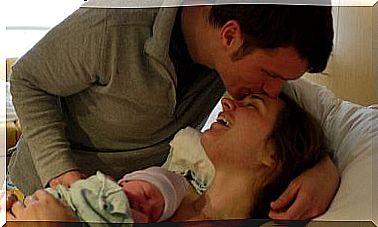Colic In Infants: A Common Disorder During Breastfeeding – You Are Mom

According to experts, infant colic affects 15% of babies in the first three months. These abdominal cramps, called infant colic, are accompanied by inexplicable, inconsolable, and intermittent crying.
Typically, this colic is more frequent in the evening. The seizures last about three hours a day and repeat at least three times a week. They appear from the third week of life and disappear three months later.
The baby suffers from intense, rapid and very painful intestinal spasms. During these seizures, you will see him flex his arms, bring his legs towards his stomach, clench his fists and expel gas through the rectum. You will also find him very irritable.
What are the factors that provoke colic in infants?

According to studies, infant colic is a common problem during the first three weeks of life. Over 40% of breastfed babies suffer from it. Although the origin of these colic is still unknown, many factors may be important.
Immaturity of the central nervous system
The first few weeks the baby receives excessive stimulation. It is therefore extremely sensitive to the outside world.
Immaturity of the digestive system
The baby suffers from gastric reflux when he eats food. This is why he occasionally regurgitates them. It can cause sharp pain.
Lactose intolerance
From birth, children can be intolerant to certain proteins found in cow’s milk. It is therefore recommended to give these babies soy milk or other proteins to prevent them from suffering from colic. Call your pediatrician to get the correct diagnosis.
Improper ingestion of food
Babies sometimes go for hours without eating. When they are finally fed, either breast or bottle, they can ingest air or eat too greedily.
Parents’ anxiety
Parents whose babies have infant colic are often more nervous and anxious. They unwittingly pass on their stress to their more crying baby. We recommend that parents consult the advice of a pediatrician who is an expert in infant colic.
He will answer all your questions and give you all the means necessary to help your toddler. It should calm you down.
How do I know if my baby has infant colic?

There are different symptoms that should help you know when your baby is suffering from infant colic. We give you the main ones:
- Your baby is more irritable and restless.
- At certain times of the day, her stomach is hard to the touch.
- In a seizure, your baby does not respond to stimuli as she usually does. He doesn’t calm down despite your best efforts.
- Your baby has difficulty passing stools and passing gas.
- The seizures always appear at the same time, around five in the evening.
- Your baby cries for a long time.
- He is a light sleeper and has trouble staying asleep.
How can I help my baby?
We are going to give you some techniques to soothe your baby’s crying and colic.
Place a warm hot water bottle or a small blanket on her stomach. The heat should soothe her crying.
When your baby has a seizure, massage her tummy in a clockwise circular motion. You can also massage her back to relieve the pressure.
Change your baby’s position. Find the one that will facilitate his intestinal transit. Moving it around should soothe stomach acid pain and make it easier to get rid of gas.
It is a great idea to stimulate your baby by playing music, if possible the same one you used to listen to during your pregnancy. Take him in your arm, against your chest, to make him feel more secure. This should relieve him immediately.
If you’ve tried everything and nothing works, go to Plan B. Let your baby calm down and fall asleep on his own. Turn off the light, be quiet, and take a moment to relax. Remember, you are passing your anxiety on to your baby.
When he wakes up, you will be in a better position to give him that love so pure and wonderful that only mothers can offer.









